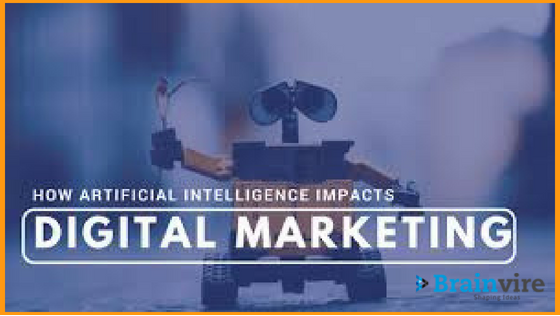AI-driven customer service refers to applying artificial intelligence technologies to automate and improve the customer support experience in ecommerce. Providing outstanding customer service is critical for business success in today’s increasingly competitive e-commerce landscape.
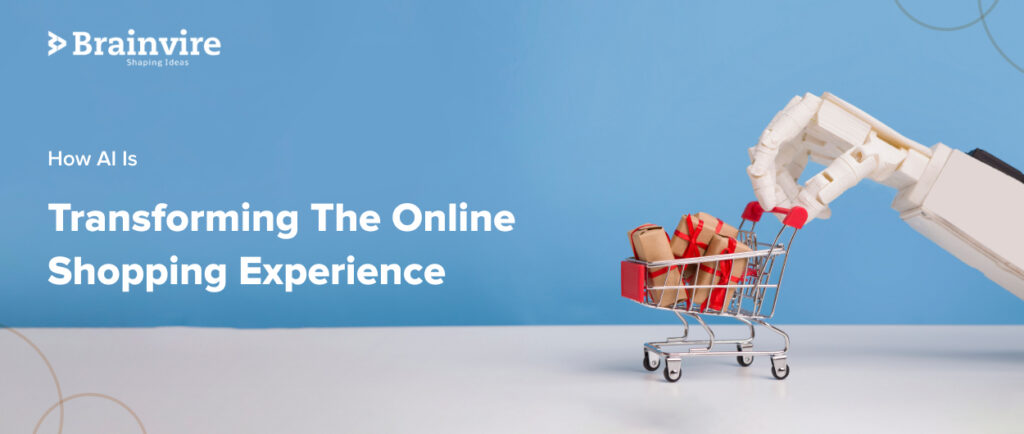
AI-powered customer care systems may give clients immediate assistance and personalized recommendations, increasing customer happiness and loyalty. However, alongside the possibilities are the AI customer service challenges.
This article will examine how AI-powered customer service may improve the eCommerce buying experience while showing you a side of the potential drawbacks. So continue reading as we understand more about the transformation and the challenges of AI in eCommerce customer experience in the following sections.
AI Applications In Customer Service

Artificial intelligence (AI) is changing the face of customer care by giving companies new tools to connect with their clients and deliver great service. Automating customer service procedures, streamlining communication, and decreasing overhead are all possible with the help of AI apps. Artificial intelligence (AI) is changing the way businesses handle customer service.
Chatbots And Virtual Assistants
AI in online shopping is rising at a tremendous pace. The use of chatbots and other virtual helpers in customer support is rising. To free up human agents’ time for more difficult client concerns, AI-powered solutions can handle simple inquiries like verifying order status, tracking shipping, and answering frequently asked questions (FAQs).
Chatbots are conversational software that uses NLP and machine learning to mimic human interaction. Customers can get prompt responses to their questions when they are linked to messaging apps, social media platforms, and websites. Simple client requests are within the chatbot’s capabilities, and it can learn from past interactions to enhance its responses.
On the other hand, virtual assistants are far more advanced than chatbots. Reservations and flight bookings are only two examples of the more sophisticated consumer requests they may fulfill. Smart speakers and smartphone virtual assistants are two examples of voice-activated devices that can access virtual assistants.
Businesses can gain a lot from implementing chatbots and virtual assistants. They can multitask and respond to customers’ needs quickly and effectively. They can potentially lessen customer wait times and boost overall satisfaction because they make fewer human agents unnecessary and help companies save money.
Natural Language Processing (NLP)
NLP, or natural language processing, is a branch of artificial intelligence concerned with translating between computer code and human speech.
Machines can now learn to read, comprehend, and even create a new human language with the help of NLP. Applications in customer service that use natural language processing include chatbots, virtual assistants, and sentiment analysis.

Chatbots and virtual assistants can interpret and respond to user input using natural language processing. Natural language processing algorithms analyze consumer comments and provide pertinent rejoinders. Natural language processing (NLP) can also aid chatbots and virtual assistants in understanding and responding appropriately to sarcasm and comedy.
Another useful NLP used for CSRs is sentiment analysis. To gauge customers’ moods, sentiment analysis examines their input through machine learning algorithms. This can increase customer satisfaction and loyalty by allowing firms to respond promptly to client concerns.
Predictive Analytics
Predictive analytics is a branch of data science that leverages machine learning algorithms to make forecasts and projections by analyzing historical data. By harnessing the power of predictive analytics, organizations can proactively anticipate and cater to customer demands in the realm of customer service.
Firms can use predictive analytics to keep consumers at risk of leaving by providing targeted promotions and individualized service. Predictive analytics in customer service is another area where efficiency gains can be made.
Customer data analysis can inform business choices like employment, training, and resource allocation to reveal patterns and trends. This has the potential to enhance customer service while cutting costs for enterprises.
Benefits Of AI-Driven Customer Service For eCommerce
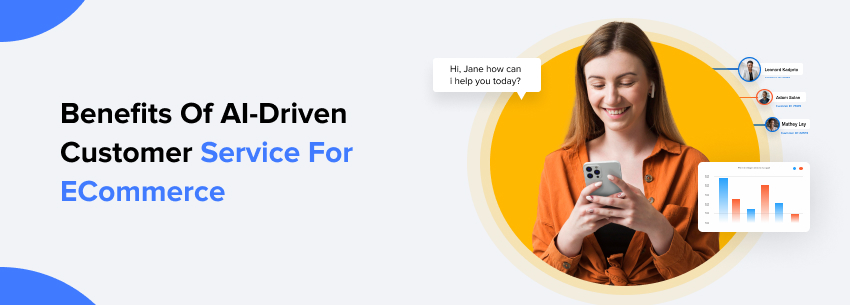
If you ask how is AI changing eCommerce, there’s more than one way to describe the scenario!
Customers today want their purchases to be processed quickly and without any hitches. With the rise of eCommerce, the ability to provide first-rate customer service is more crucial than ever. Businesses may now offer 24/7 support that is individualized and efficient, thanks to advancements in AI.
24/7 Availability
The availability of assistance at any time of day or night is a major advantage of AI-powered customer service. Chatbots and other virtual assistants allow businesses to serve clients instantly, regardless of location or time of day.
Customers can get answers to their questions immediately, rather than waiting for customer support representatives to become available. Furthermore, with AI-driven customer care, agents can field multiple requests simultaneously, keeping customers from waiting. This can assist businesses in keeping customers from having to wait too long, lowering customer dissatisfaction and boosting satisfaction.
Personalization And Customization
AI can help organizations tailor their customer service to each individual’s wants and needs. Businesses can better respond to customers’ needs by analyzing their data and using machine learning to spot trends in customer activities.
This implies that patrons receive individualized guidance and suggestions, resulting in a more satisfying and productive shopping experience. For instance, product recommendation systems driven by AI can make suggestions to customers based on their past purchases, browsing habits, and personal preferences. Additionally, an AI marketing agent can further enhance this personalization by creating targeted campaigns and offers tailored to individual customer profiles.This not only aids in consumer satisfaction by facilitating the discovery of products of interest but also boosts revenue via upselling and cross-selling.
In addition, virtual assistants powered by AI may tailor their assistance and suggestions to each customer. This may be addressing frequently asked questions, tracking the status of orders, or offering product details. Companies that take the time to learn about their client’s unique needs and provide tailored solutions tend to have happier, more loyal partner.
Increased Efficiency And Cost-Effectiveness
Using AI in customer care can increase productivity while decreasing overhead for online retailers. Because of their efficiency, chatbots and virtual assistants replace certain human customer support representatives. This has the potential to reduce costs and increase efficiency in supporting customers for enterprises.

Automation enabled by AI can also simplify mundane processes like order fulfillment. As a result, workers will have more time to focus on high-level activities and projects, which is good for output and efficiency.
Improved Customer Satisfaction And Loyalty
eCommerce enterprises can increase client happiness and loyalty by focusing on individual needs and offering prompt, professional service. As a result of the speed and accuracy with which AI-powered customer care can answer inquiries, consumer annoyance is reduced, and the purchasing experience is enhanced.
Customers might feel even more cherished and appreciated because of the best AI customer service. Businesses can enhance customer loyalty and repeat purchases by developing meaningful, personalized relationships with their clients based on their unique wants and needs.
Better Data Collection And Analysis For Decision-Making
AI-powered customer service can also help firms collect and analyze data more effectively for decision-making. Insights about the target market and growth opportunities can be gleaned by examining client behavior and preferences. Product popularity, client frustrations, and service quality are all areas where this can be done.
Furthermore, organizations can benefit from real-time feedback and analytics provided by AI-powered customer support. This can aid companies in differentiating themselves from the competition, spotting emerging market trends, and establishing long-term growth strategies.
Challenges And Limitations Of AI-Driven Customer Service
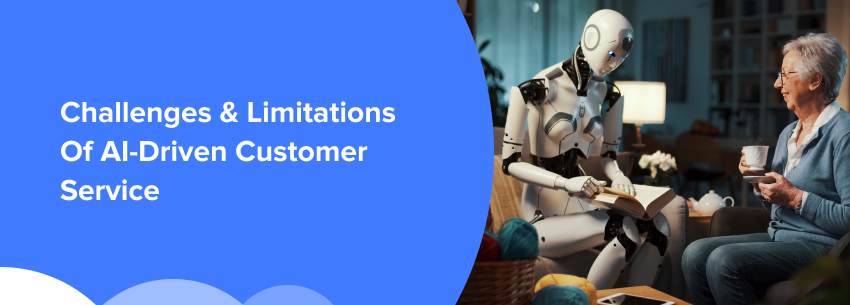
The rapid development of artificial intelligence (AI) has disrupted the customer service industry. With the rise of AI in eCommerce and customer care, businesses can better address their clients’ questions and issues on time, boosting customer retention and satisfaction. However, there are several caveats to using AI-driven customer support.
Limited Understanding Of Complex Customer Queries
Customer service that AI powers have substantial hurdles due to the technology’s inability to comprehend more nuanced questions. AI-powered chatbots and virtual assistants are improving but still need to recognize nuances and context in more complicated questions.
Artificial intelligence (AI) systems rely on significant data and follow predetermined algorithms to perform accurately.
They are limited in their responses to questions about the information and data with which they have been programmed. This means that the AI may need to learn how to respond properly if a user asks a query it hasn’t been trained to recognize.
Sometimes, though, a customer’s condition or problem is so specific or intricate that it can only be solved with the help of a live person. In certain situations, AI-powered customer service would not be adequate, and clients might grow dissatisfied due to the lack of individualized attention.
Dependence On Technology And Lack Of Human Touch
Another major drawback of AI-driven customer service is its reliance on technology, which might result in the absence of human touch. Artificial intelligence algorithms can process several customer inquiries simultaneously, but they can’t match the human level of intelligence and compassion.
AI-driven customer care may not be able to deliver the same level of emotional connection as a human person, which is essential to many customers. To get around this shortcoming, businesses can provide a hybrid style of customer care in which AI-powered chatbots and virtual assistants handle simple inquiries. At the same time, human agents address complicated queries requiring emotional intelligence and empathy.
Risks Of Data Privacy And Security
Data is essential to AI customer service, but as the amount of data we collect grows, so does the possibility of hacking and other security breaches. A company’s reputation can be severely affected if customers’ personal information is compromised through hacking, theft, or improper use.
In addition, organizations must guarantee that GDPR and CCPA requirements are met by their AI-driven customer care platforms. There will be severe repercussions for those who break the rules outlined here.
Need For Ongoing Maintenance And Updates
Maintaining the effectiveness of AI-driven customer care systems calls for regular upkeep and revisions. Artificial intelligence (AI) systems require constantly updating their underlying algorithms to accommodate shifting consumer tastes.
Furthermore, organizations must ensure that their AI-driven customer support solutions are safe and error-free. If you keep up with their maintenance, you can avoid experiencing downtime and losing the trust of your customers.
Potential For Misinterpretation And Bias In AI Algorithms
Artificial intelligence algorithms are built to glean insights from past information and patterns. However, they are not infallible and can be influenced by bias and misinterpretation to produce unjust results.
Inadvertent bias towards particular groups based on ethnicity, gender, or age is one potential risk AI systems pose. Companies risk serious harm to their reputations and legal ramifications if this happens.
AI algorithms may not consider the human context of a situation, resulting in incorrect or inappropriate replies. Businesses must guarantee that AI-powered customer service systems are frequently reviewed and monitored for bias and discrimination.
Best Practices For Implementing AI-Driven Customer – Service in eCommerce
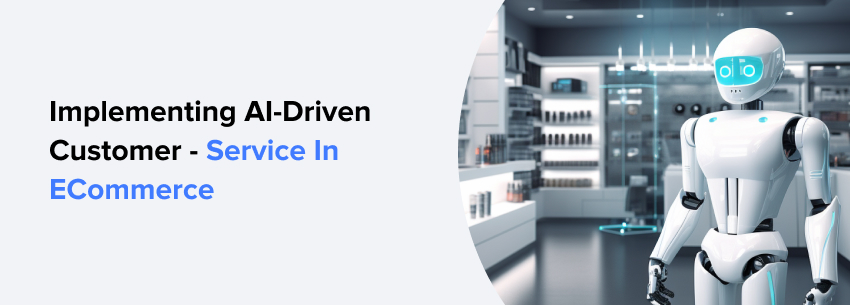
AI in eCommerce customer service has been a game-changer for the industry. Thanks to AI-powered customer care, businesses may now offer customized help, faster responses, and a better overall experience. But it takes careful planning and execution to successfully adopt AI-driven customer support in eCommerce.
Identifying Customer Needs And Pain Points
Identifying your client’s demands and pain spots is the first step in deploying AI-driven customer service. Find out what your consumers want, their issues, and the type of help they anticipate receiving. Data analysis of client activities, including searches, purchases, and reviews, can help.
You may also gather customer input by sending questionnaires or hosting focus groups. After identifying your customers’ most pressing problems, you can utilize AI to deliver individualized assistance tailored to their needs.
Choosing The Right Technology And Tools
The effectiveness of AI-driven customer service relies heavily on selecting appropriate technology and solutions. Chatbots, voice assistants, and NLP are only some of the available artificial intelligence (AI) technologies. Select a technology that can meet your company’s and customers’ demands.
For instance, you can employ chatbots to offer instant service if your customers prefer text-based contact. In contrast, voice assistants like Amazon Alexa and Google Assistant can communicate with clients who prefer this method. Similarly, natural language processing can decipher consumer inquiries and supply appropriate responses for a higher level of service.
It’s about more than having the proper technology; picking the correct data analysis and management tools is just as important. Ensure the tools you choose to deal with massive amounts of data are compatible with your artificial intelligence system.
Developing A Knowledge Base And Training Data
Building a knowledge base and training data for AI-driven customer care is crucial. Your AI system must be fed correct and relevant data to respond appropriately to consumer inquiries.
The best place to start when building a knowledge base is by examining client questions and comments. Then, you can compile a database of FAQs (and their answers). Reviews and customer comments can help you spot trends and create workable responses.
If you want your AI to respond intelligently to client questions, it must be trained with appropriate data. Your AI will need a vast amount of training data, such as questions asked by customers and their answers, too function correctly. To educate your AI to spot trends and offer reliable responses, you can use machine learning techniques to examine this data.
Integrating AI With Human Support
For optimal customer support, combining AI with human assistance is essential. While AI can answer common questions and offer prompt aid, there may be times when human interaction is necessary.
If a consumer has a challenging problem, the AI system can hand them over to a human person for assistance. Also, if a client has issues with the help they received from the AI, the system can hand them off to a real person.
The accuracy and applicability of AI solutions can be enhanced by combining AI with human support. Human agents can review and validate the AI system’s responses to ensure they are correct and applicable.
Regularly Monitoring And Improving Ai Performance
For AI-powered customer service to be effective, its performance must be regularly monitored and improved. You must routinely examine usage data and client feedback to spot problem areas.
Customer satisfaction surveys can be used as a barometer of AI effectiveness. Analytics tools can be used to keep tabs on how well your AI system is functioning and pinpoint any areas in which it cannot produce satisfactory results. You can use this information to change the AI system, such as upgrading the algorithms or training data.
User testing can also be used to keep tabs on how well AI is performing. To assess your AI system’s efficacy, enlist a testing team’s help. With this information, you may fine-tune your AI system to alleviate any problems your consumers are having.
Regular updates and enhancements to your AI system are as important as monitoring its performance. This may require introducing new features, changing the training data, or adjusting the algorithms. If you tweak it regularly, you can keep your AI system useful and up-to-date for your clients.
Future Of AI-Driven Customer Service in eCommerce
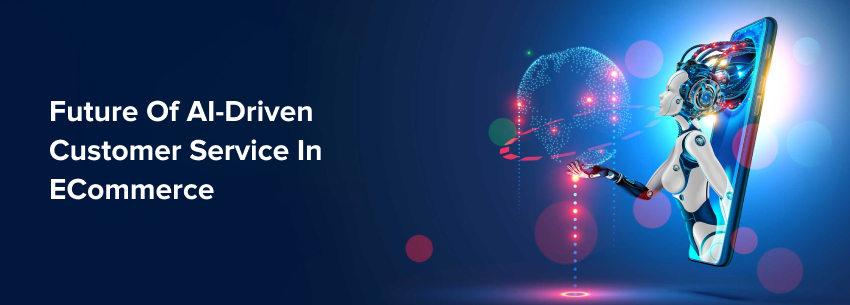
To better serve their consumers, many online retailers are turning to AI-powered chatbots and other forms of customer support. With the help of AI, businesses can now offer customized services, speed up response times, and improve their customer’s overall satisfaction. The use of AI to improve eCommerce customer service has promising prospects as technology advances.
Trends in Ai-Driven Customer Service in Ecommerce
The usage of chatbots in eCommerce customer support driven by artificial intelligence is a growing trend. Chatbots are conversational interfaces powered by artificial intelligence that may offer rapid help to clients.
Chatbots are gaining popularity in the eCommerce sector because of their ability to answer frequently asked questions and provide tailored assistance. Reduced response times and an improved customer experience are two other benefits of using chatbots.
Natural language processing (NLP) is another emerging area of AI application in eCommerce customer care. NLP, or natural language processing, is a subfield of artificial intelligence that teaches machines how to decode and make sense of human speech.
In eCommerce, NLP is used to decipher consumer questions and reply appropriately. By learning about a customer’s likes and dislikes, NLP may tailor a service to each individual’s needs.
Emerging Technologies in Ai-Driven Customer
eCommerce’s AI-powered customer care benefits from several future innovations. Augmented reality (AR) is one example of such a tool. Augmented reality (AR) is a technology that combines real-world objects with virtual ones.
Customers can have a more satisfying online buying experience with the help of augmented reality. Using augmented reality, consumers can imagine an item’s appearance in their environment before purchasing.
Voice assistants are another up-and-coming technology in AI-driven customer support. Virtual assistants that can understand and act on voice commands are known as “voice assistants.” Due to the convenience of a hands-free shopping experience, voice assistants are gaining popularity in online retail.
Voice-activated assistants free customers from using a mouse or keyboard when conducting product research, purchasing, or contacting customer service.
Predictions for the Future of Ai-Driven Customer Service in Ecommerce
The future of AI-powered customer support in online retail seems bright. Predictions include an increase in the level of individualization in customer care provided by AI.
With the help of AI, businesses will be able to better cater to individual consumers by examining their browsing and purchasing habits. Artificial intelligence systems will also be able to foresee client requirements and offer proactive assistance.
AI-powered customer care is also anticipated to merge with other platforms eventually. For instance, a more immersive purchasing experience might be provided by combining AR with AI-driven customer support. Customers might enjoy a hands-free shopping experience by combining AI-powered customer care with voice assistants.
Proactive AI-powered customer service is an option for the future. With AI, businesses can evaluate client data and predict when problems may arise. By analyzing consumer data, AI systems could forewarn those most likely affected by shipping delays.
To Sum Up
The advent of AI-powered customer service with the ability to offer tailored, time-saving solutions around the clock has the potential to transform the online retail industry completely.
By combining AI with chatbots, virtual assistants, and recommendation engines, companies can provide customers with a frictionless and exciting purchasing experience, increasing the likelihood that they will return and promote the brand to others.
By putting AI to work for eCommerce customer experience, they can boost customer satisfaction, sales, and profits, all while decreasing expenses. Remember that AI isn’t a magic bullet; firms must balance automated and human elements for a genuinely remarkable customer service experience.
[Continue reading: Artificial Intelligence: The impacts of the Top Industries in 2023]
FAQs
AI-driven customer service is called artificial intelligence technology like chatbots, virtual assistants, and machine learning algorithms to automate and improve customer care interactions.
AI-powered customer care may enhance the Internet buying experience by offering 24-hour availability, personalized recommendations, faster response times, and more efficient issue resolution.
The potential for bias and errors, a lack of empathy and emotional intelligence, difficulties with complicated issues and demands, and the need for continual maintenance and updates are all challenges and limitations of AI-driven customer service.
Amazon’s Alexa virtual assistant, Sephora’s Virtual Artist chatbot, and Stitch Fix’s personalized styling tips backed by machine learning are all examples of eCommerce enterprises employing AI-driven customer care.
AI replacing human customer service representatives is a far-fetched reality. One of the greatest drawbacks of using AI as a customer service representative is their limited approach toward customers.
On the contrary, having individual representatives gives a more humane touch to the entire process and allows professionals to resolve different issues without delay.
Related Articles
-
The Impact Of AI On Digital Marketing
Talking About The Impact Of AI On Digital Marketing, We’ve already crossed the mid of 2018 and I’m sure none till now is unaware of the buzz artificial intelligence has
-
How Combination of BigCommerce and AI Helps E-commerce
In the rapidly changing e-commerce world, businesses constantly strive to enhance consumer experiences, generate more money as well as make their processes less complicated. BigCommerce is one of the leading
-
The Pros and Cons of Shopify: Retail Ecommerce Solution
Many business owners wonder whether or not they should employ an ecommerce platform to help them sell digital their products. However, with so many choices on the market, it can


